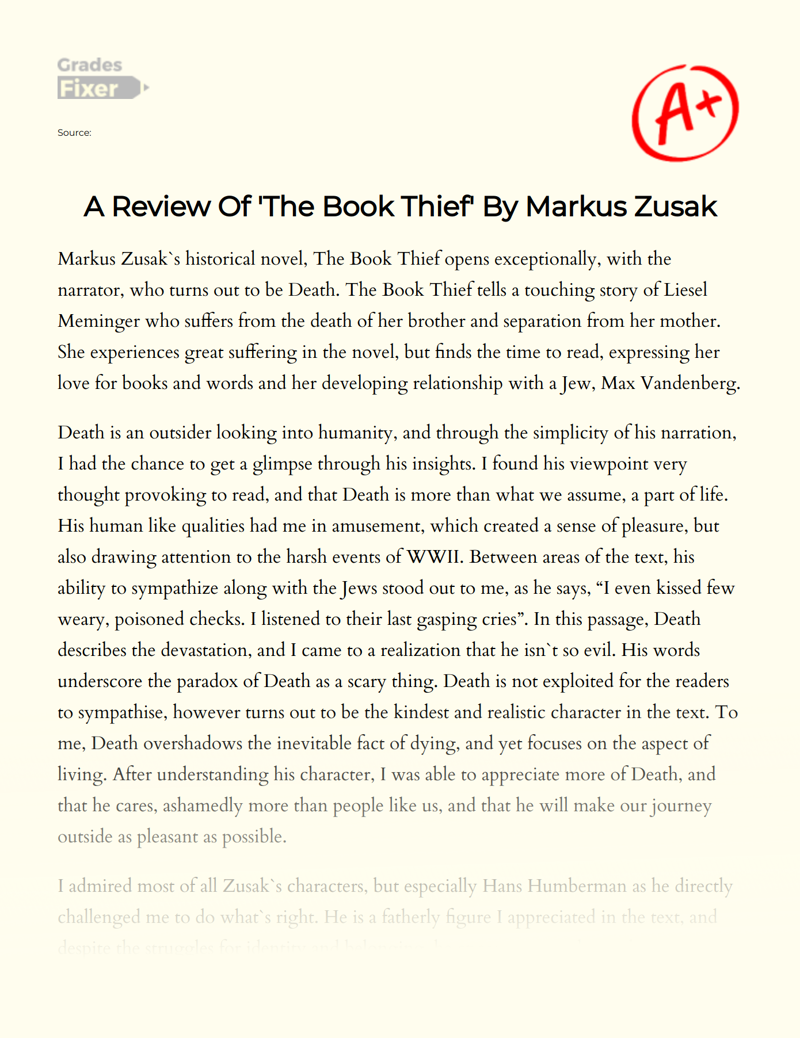Death in The Book Thief Essay Example
Writing Death as the narrator allows the audience to gain a unique perspective on people as well as their capacity for beauty and cruelty. During a time of war, a personified version of death helps emphasize the dark side of human nature, which simultaneously highlights the good. The notion that love is meaningless without hate is especially applicable in a story taking place in the center of such devastating events.
Death observes how cruel people can be, and their willingness to cause trauma and hardships towards others. Though people often think Death is a symbol of maliciousness, the narrator brings the audience to the realization that it's humans who are truly evil. “It probably had more to do with the hurled bombs thrown down by humans hiding in the clouds (Zusak 13).” Taking place during a time of intense violence, this story gives countless examples of how dark humanity can easily be. However, the intensity of the evilness within humanity, allows the good to be amplified. Death has observed the main character experience of both sides of human nature throughout the story. Death explains, “I wanted to tell the book thief many things, about beauty and brutality. But what could I tell her about those things that she didn’t already know (Zusak 550)?” Liesel meminger has been on the receiving end of both love and tragic loss, which makes her story so interesting to the narrator.
Through all of the mayhem caused by humans and their lack of humanity, Death invests in the stories of insignificant seeming people. Those that aren’t fighting wars, or dropping bombs, but simply trying to survive the chaos around them. “Which in turn brings me to the subject I am telling you about tonight or today, or whatever hour and color. It’s the story of those perpetual survivors-an expert at being left behind (Zusak 5).” Death explains that he has seen the most catastrophic disasters, and wants to cherish the moments in between. With an eternity of torment, Death finds comfort in the stories of ordinary people. Death explains to the audience, “Yes, I have seen a great many things in this world. I attend the greatest disasters and work for the greatest villains. But then there are moments. There’s a multitude of stories (a mere handful as I have previously suggested) that I allow to distract me as I work, just as the colors do (Zusak 549).” The importance of simplicity is important to Death, who is experiencing an eternal existence of chaos.
Regardless of the madness people will inevitably cause, Death explains his envy of them. Death is constantly finding humans in their righteousness and in their wickedness. However, one thing all of humankind has in common is death itself. Death narrates, “I wanted to explain that I am constantly overestimating and underestimating the human race-that rarely do I ever simply estimate it. I wanted to ask her how the same thing could be so ugly and so glorious, and its words and stories so damning and brilliant. (Zusak 550).” The unending burden Death carries makes him desire human mortality. Death says, “Still, they have one thing I envy. humans, if nothing else, have the good sense to die (Zusak 491).” Death is immune to expiration, which is what Death desires most.
The uniqueness of Death’s role in the story allows the audience to observe mankind’s compass of both good and evil. Death passes his time by entering the world of ordinary lives, living through extraordinary circumstances. From the beginning of the story, Liesel Meminger faced obstacles that led Death to invest in her story. Death uses Liesel’s story as a distraction from the existence of unceasing mayhem.

Related Samples
- Social Classes in The Great Gatsby Essay Sample
- Of Mice and Men Movie Analysis Essay Example
- Individuality And Conformity In Franz Kafka's The Metamorphosis
- The Veldt by Ray Bradbury Literary Analysis Essay Sample
- Emma by Jane Austen Literary Analysis Essay Sample
- The Dystopian Society in The Giver by Lois Lowry Essay Example
- Girl by Jamaica Kincaid Literary Analysis Essay Example
- Orsino and Olivia Character Analysis in Twelfth Night Analysis
- Comparative Essay Example: The Tell Tale Heart and The Landlady
- Their Eyes Were Watching God by Zora Neale Hurston Analysis
Didn't find the perfect sample?

You can order a custom paper by our expert writers

The Book Thief
Markus zusak, everything you need for every book you read..
Death in The Book Thief Essay Example
Death? Who or what is Death? Death, as we know it in the real world, marks the end of a person’s life, yet as presented in the novel, Death isn’t all that horrific. The novel, ‘The Book Thief’ by Markus Zusak, is a story narrated by an omniscient figure, Death. Who watches over Liesel and tells us her tale. He describes her as a little girl growing up in Germany during World War Two. She collects books, teaches herself to read, and finds solace in words. During the war, she befriended Max, a Jew, who was being sheltered by her family since they didn't want him to be persecuted. In the end, Max and Liesel are the only main characters who escape the war. Death plays an essential role in this novel because we perceive the world through the eyes of Death, providing the readers, with a new and distinct viewpoint on 'death.' In the novel, Death is presented as a human individual and is capable of experiencing grief, sympathy, and expressing humour. Death, as a narrator, demonstrates that he does not always have to be terrifying, but can also be nice.
Death's personality demonstrates that Death, too, has a heart. Death has so much compassion and affection for Liesel since he has been watching over her for a long time. Shortly after Liesel's brother dies, Death intervenes and says, "I wanted to say: "I'm sorry, child," and he truly meant it. "But that is not allowed." (Zusak 13). Death’s grief is emphasized in these lines, as he sincerely cares about Liesel and is devastated by her circumstance, but has no choice as his presence cannot be discovered. As a part of his job he is merely a bystander, and no matter how much he wishes to, he is unable to act. As a result, despite his affection for them, he is not obliged to show his feelings and comfort Liesel. He must only observe from the sidelines, and watch as tragedy is struck for those around him. Most people regard death as a sombre and even frightening figure. But for Death to offer love and compassion to a regular person reveals a lot about his nature and demonstrates that he truly does care. Death has a great deal of sympathy for humans and people who are dying throughout the novel. He despises his job and does not want to see anyone die, so he goes on to say, “Please believe me when I tell you that I picked up each soul that day as if it were newly born. I even kissed a few weary, poisoned cheeks….I took them all away, and if ever there was a time I needed distraction, this was it. In complete desolation, I looked at the world above.” (Zusak 350) This demonstrates Death's sympathy for all the victims he takes away since he is troubled by the sight of their lifeless corpses and feels the urge to console and soothe each soul he collects, carefully resting them in his arms. Not only was Death torn about his job, but he also suffered from remorse and humiliation over his life's purpose. To add to Death’s personality, it is revealed that Death also has a quite dark sense of humour, which he expresses in this statement, “Mystery bores me. It chores me. I know what happens and so do you. It’s the machinations that wheel us there that aggravate, perplex, interest, and astound me” (Zusak 243). This phrase expresses humour because Death teaches us that when we think about our own deaths, we may laugh about it or make each day of our lives significant since we never know when it will be our last. This is demonstrated when Death reveals when certain characters die, since the characters' deaths are not as significant as how they spend their lives. Death also discloses when characters die before describing how they die, implying that we must know the endpoint before embarking on a trip, but it is the journey that is important. To live a meaningful life, goals must be set, and how those goals are accomplished is more important than whether or not they are met. Death does have a sense of humour and utilizes it brilliantly, but he also delivers powerful messages. Ultimately, Death's personality demonstrates that the way Death is pursued in the real world demonstrates that Death isn't what most people think of him to be, that he isn't someone to fear, but rather someone to admire.
Death is portrayed as a person, capable of feeling grief, sympathy, and expressing humour. As a narrator, Death proves that he does not always have to be frightening, but can also be nice. Death instills that, death, is more than simply the end of someone's life; it may also be the beginning of a new existence, the afterlife. Overall, Death has completely shifted the reader's perspective of ‘death’ throughout the novel.
Related Samples
- Essay on Gender Roles in Cathcher in the Rye
- 1984 Power Essay Example
- Comparative Essay the Necklace and the Joy Luck Club
- Long Way Down by Jason Reynolds Book Analysis
- The Giver Jonas’s World Analysis Essay Example
- Evicted Book Analysis Essay
- Gulliver's Travels by Jonathan Swift Literary Analysis Essay Sample
- Theme of Neglect in To Kill A Mockingbird and The Nickel Boys
- Theme of Decisions in Night by Elie Wiesel Essay Example
- Obsession on Childhood Theme in The Catcher in the Rye Essay Example
Didn't find the perfect sample?

You can order a custom paper by our expert writers
Themes and Analysis
The book thief, by markus zusak.
‘The Book Thief’ is a historical novel based on the events of the Holocaust and Second World War and the suffering and death experienced by people.
About the Book

Article written by Juliet Ugo
Former Lecturer. Author of multiple books. Degree from University Of Nigeria, Nsukka.
When analyzing The Book Thief , there are several themes one needs to look at. The majority are themes of the power of words, kindness, and cruelty of humans, reading and writing, the duality of the Nazi era, mortality, and love.

The Book Thief Themes
The power of words.
In The Book Thief , we see that words and, in extension, stories are among the most powerful ways people connect. So many examples show how the words connect people up throughout the story. Through learning the alphabet and how to use it to make words, Liesel and Hans Hubermann began developing their deep bond. Liesel’s descriptions of the weather to Max later in the novel also help establish a bond between them.
In the book, the greatest gift Max gives Liesel is words in the form of the ‘The Word Shaker,’ the story he writes for her. In the story he wrote, he suggests that words are the most powerful force there is. He said that Adolf Hitler uses just words and not guns or money or some other instrument to take over the world.
The story shows how Liesel has used words to create a refuge for herself amid Nazism and later uses words to calm her neighbors during the air raids by reading from her book. Again, the power of words is seen in the book she left behind, giving her a connection to Death as we saw at the end of the story.
The Kindness and Cruelty of Humans
We see the various degrees of human cruelty and kindness in the novel, from the slight to the most extreme examples.
One of the small acts of kindness we see in the novel includes hiding and caring for Max by the Hubermanns even at great risk to themselves, Rudy giving the teddy bear to the dying pilot, Ilsa Hermann inviting Liesel into her library. Liesel is specially kind to Max, and the two share a strong bond. Because of the political context of the time, with hatred and violence against Jews being rampant, Max finds Liesel’s kindness to be extraordinary. On the contrary, we also see acts of cruelty, like the treatment of Rudy by Viktor Chemmel and Franz Deutscher. Again, the concentration camps linger unseen in the book’s background as the most extreme example of cruelty.
There was a scene that showed both kindness and cruelty at once. There, Hans Hubermann tries to help a weak Jew suffering hunger and deprivation, being marched through town on the way to Dachau. Hans reaches out to him and gives him a piece of bread, a small act of great kindness. Immediately though, one of the Nazi soldiers mercilessly whips Hans and the Jewish man, a great act of cruelty heightened by the fact that it comes in response to Hans’s kindness.
We can not analyze the themes in The Book Thief without talking of mortality as Death is the book’s narrator. The book shows us that mortality is very present in the lives of each character as Death introduces the book to the reader. All through the novel, the deaths of the main characters reaffirm the presence of mortality. Since The Book Thief story takes place during World War II, Death and genocide are almost omnipresent.
Death is presented in a less distant and threatening manner as he narrates and explains the reasons behind each character’s destruction. Again, Death expatiates how he feels that he must take each character’s life, so there is a sense of care instead of fear. At a point Death states, ‘even Death has a heart.’
Reading and Writing
We see language, writing, and reading presented as symbols of expression and freedom all through the novel. Reading and writing provide identity and personal liberation to those characters who have them and provide a framework for Liesel’s coming of age. At the start of the story, shortly after her brother’s funeral, Liesel finds a book in the snow, but she cannot read. Learning under her foster father Hans, she slowly learns to read and write. By the time the novel comes to an end, her character arc has been shaped by her progress in reading, writing and learning a language.
Writing and reading skills also serve as social markers since wealthy citizens are literate, owning books and even their libraries. On the other hand, the poor and illiterate do not own books or libraries. Rosa Huberman’s harsh and, at times, scathing remarks towards her family and others are an example of the despairing lives of the poorer classes. In contrast, Liesel’s repeated rescues of books from Nazi bonfires show her reclaiming freedom and also refusal to accept being controlled by the all-pervasive state.
The Dualities of Nazi-era Germany
We notice that the characters often have two sides or faces starting from the time Rudy paints himself black in imitation of Jesse Owens.
Superficially, Rudy looks like an ideal Aryan, such that the Nazis try to recruit him into a special training center. However, deep inside him, he is similar to an African-American, which directly contradicts Nazi ideology. Max also does something similar when he travels from Stuttgart to Molching when he pretends to be a non-Jewish or gentile German, calmly reading MKPF, while on the inside, he is a terrified Jew who finds the book despicable. This clearly shows the theme of duality in the book.
The Hubermanns are part of the theme and started living double lives immediately after they started hiding Max.
To their neighbors and friends, they pretend to be law-abiding citizens to their friends and neighbors; they harbor their dangerous secret inside. Hans teaches Liesel about this double face after he slaps her for saying she hates Hitler in public. He told her that she can hate inside the house but once they are outside, she must behave in a certain way. In fact, duality is a theme of life in general for Liesel and Rudy as they both spend a lot of time engaged in typical teenage activities like playing soccer in the street. However, these moments are broken up with events like the parade of Jews through town or the bombings that threaten and ultimately destroy Himmel Street.
In spite of the fact that war, Death, and loss caused a lot of damage to Liesel and the others, love is seen as an agent of change and freedom. This is because love is the only way of forming a family where real freedom exists. Liesel got the best of her traumas by learning to love and be loved by her foster family and her friends. At the start of the novel, Liesel is traumatized by the Death of her brother and her separation from her only family and the larger issues of war-torn Germany and the destruction wrought by the Nazi party.
Liesel’s relationship with her foster father Hans helps create healing and growth reflected in the relational dynamic between the Hubermann family and Max. The Hubermanns’ association with Max defies the Nazi regime in a society governed by policies that presume to judge who is really human. Furthermore, the love that Max and Liesel develop through their friendship creates a strong contrast to the fascist hate in the story’s backdrop.
Analysis of Key Moments in Animal Farm
- When Liesel’s brother died. This event marked the start of the story, which led her to foster parents. It also started Liesel’s stealing of books when she picks up The Grave Digger’s Handbook at the site of her brother’s burial.
- Arrival on Himmel. This event sets the stage for the rest of the book as it marks Liesel coming to live with Hans and Rosa Hubermann after the loss of her family.
- Early school failure. Liesel didn’t succeed in school when she tried earlier and she became determined to learn how to read.
- Book burning day. The event of burning books on Hitler’s birthday helped Hans discover that Liesel is stealing books.
- Arrival of Max Vandenburg on Himmel Street. This event changes the Hubermann’s lives when Max arrives on their doorstep in 1940. Hiding him put their lives in immense danger.
- Max writing The Standover Man for Liesel. This event helped to bring Max and Liesel together and they not only read words but also share them.
- Giving bread to the Jew. The event of Han giving bread to a weak Jew is significant because it leads to Max’s departure and Hans being sent away to fight in the war.
- Rudy idolizing a black man despite his perfect Aryan features. Rudy used the Jesse Owens event to exemplify the views of the main characters of the book.
- The Nazi recruiting Rudy. The Nazis noticed Rudy’s physical and mental capacities and therefore recruited him to go to school to become the perfect German. His parents refuse, and Alex Steiner is sent to war.
- Bombing of Himmel Story. This is a major event in the book where Liesel’s street is bombed and she lost most of her friends and family.
- Death of Liesel. This marked the final major event in the book when death came to her soul.
Style, Tone, and Figurative Language
The style and language of The Book Thief is simple because it was primarily meant for young adults. He used a lot of foreshadowing to give the reader a sense of what is coming up in the story.
In the book, the narrator of the story, Death, uses foreshadowing in many different events to keep the reader focused on how the characters meet their ends. In Death’s side notes, foreshadowing is constantly scattered throughout the book in boldface text. A good example is when Death alludes to the death of Rudy, who is Liesel’s best friend. …He didn’t deserve to die the way he did.”
The tone of The Book Thief is serious most of the time and mocking or hopeful the rest of the times. When you have death talking about humans in the time of war, the tone will be serious and somber. Death spends a lot of time mocking, or making fun of, humans. For instance, when Death talks about humans and destruction in the quote above, he is making fun of how people like to see things get destroyed.
In the book, we see so many figurative languages used in The Book Thief . These are vivid and stimulating word choices that author’s use to add color and meaning to their work. In the book we have many of the likes of simile, metaphor, contrast, hyperbole, personification, etc. Even the narrator, death, is personified. Here are examples of other figurative languages used in the book.
She would wake up swimming in her bed, screaming, and drowning in the flood of sheets.
This quote from The Book Thief shows metaphor as the figurative language when death was describing the nightmare Liesel was having.
She did have it easy compared to Max Vandenberg. Certainly, her brother practically died in her arms. Her mother abandoned her. But anything was better than being a Jew.
Here, the figurative language is contrast as death is trying to tell the readers that any hardship is better than being a jew.
Within seconds, snow was carved into her skin.
The figurative language used is hyperbole. Sure, snow was all over her body but it was extreme exaggeration to say it carved into her skin.
Analysis of Symbols
The Book Thief uses symbols extensively because it is not just a story about a little girl. It is an important historical novel that delved into the suffering of people who lived in Germany during World War II. The story has a lot of lessons especially in mortality, kindness and love and the symbols embody all these.
Giving bread anywhere is a sign of care and comfort. Once you give bread to somebody, you have shown absolute compassion for that person. You have also comforted the person and probably solved his hunger issues. It is a symbol of empathy in the story and it was clearly demonstrated by Max when he offered bread to the weak Jew as they were marching to the gas chamber.
The accordion in the novel was inherited by Hans Hubermann from Max’s father during World War I and it became part of Han’s identity. He played regularly to those around him to give them comfort. He plays it during trying times to give comfort and care to those who hear it. Example is when Liesel realises that her mother is not coming back again and when she first came to their house.
Books were a source of comfort to Liesel and later Max. It is another major symbol in The Book Thief and it was the source of Liesel’s transformation from a weak girl to an empowered young woman. She developed a great relationship over books when she learned how to read and write and thus got the power she needed from the books. This power helped her to develop a strong character, mature emotionally and became kinder and more understanding to those around her.
What is the main theme of The Book Thief ?
The Book Thief has many themes and they include love and kindness as expressed by Liesel and her foster family; literacy and power, as seen when Liesel learns to read and explore the world of words, cruelty and suffering as experienced by the Jews in the hands of the Nazis.
What is an example of a theme?
In most literature work, we have themes that the author uses to pass his message across. Some of the common themes that run through them are love, mortality, war, peace, revenge, grace, betrayal, fatherhood, patriotism, life, isolation, cruelty, motherhood, forgiveness, treachery, wartime loss, rich versus poor, and appearance versus reality.
Is survival a theme in The Book Thief ?
There are many themes in The Book Thief like love, mortality, kindness, etc. One of the themes you will find in the book is the theme of survival. Most of the major characters in the book namely Liesel, Max, Rudy, the Hubermanns, passed through many awful ordeals but they still survived.
How do you identify a theme?
A theme is the idea the writer wishes to convey about an event, subject, or person. It is from the theme that you learn about the author’s view of the world. To identify the theme, you have to be sure that you have first identified the plot of the story, the way the story characterization, and the primary conflict in the story.
What are the steps in analyzing a theme?
Generally, here are the ways in which you can begin to analyze the theme of any literature you read. First, you look for recurring images in the story or poem, then ask questions about the author’s message. Through your answers, you’ll be able to identify the different tools the author uses to express the theme

About Juliet Ugo
Juliet Ugo is an experienced content writer and a literature expert with a passion for the written word with over a decade of experience. She is particularly interested in analyzing books, and her insightful interpretations of various genres have made her a well-known authority in the field.
Cite This Page
Ugo, Juliet " The Book Thief Themes and Analysis 📖 " Book Analysis , https://bookanalysis.com/markus-zusak/the-book-thief/themes-analysis/ . Accessed 9 April 2024.
It'll change your perspective on books forever.
Discover 5 Secrets to the Greatest Literature
There was a problem reporting this post.
Block Member?
Please confirm you want to block this member.
You will no longer be able to:
- See blocked member's posts
- Mention this member in posts
- Invite this member to groups
Please allow a few minutes for this process to complete.
The Book Thief
By markus zusak, the book thief essay questions.
Consider Zusak's use of foreshadowing. By revealing how characters die early on, or the outcomes to certain events, does Zusak make the novel less suspenseful or more?
A proper response should cite specific examples of foreshadowing and make some explanation of why the technique is used. This could be Death's rationale: "It's the machinations that wheel us there that aggravate, perplex, interest, and astound me" (243). An essay arguing that the novel is more suspenseful because of foreshadowing should involve Death's selective and incomplete revelation of facts and should compare instances of foreshadowing with the actual descriptions of the events being foreshadowed.
Why do Max and Liesel become friends? What do they have in common?
Initially Max and Liesel are apprehensive around each other, but they discover that they have something important in common: both have recurring nightmares involving the last time they saw their families alive. Both are political refugees evading Nazi persecution: Max is a Jew, Liesel's parents were Communists. Their similar backgrounds make Max's initial gift of The Standover Man important, as Max ultimately helps Liesel realize the power of words to delight and to harm others.
Hans manages to survive two World Wars, seemingly by luck. Is Hans merely a fortunate man, or does he have other qualities that help him survive?
The argument that Hans is indeed lucky should be bolstered by references to other instances of luck or fate saving characters' lives: that the Nazis fail to find Max when inspecting the Hubermanns' basement, that Hans does not formally withdraw his application to join the Nazi Party and is thus spared from being sent to a concentration camp. One quality that helps Hans is his amiability. His friend Erik Vandenberg saves him in World War I, while his willingness to give up his seat to an antagonistic young soldier saves him again in World War II.
Evaluate the pros and cons of Hans giving bread to an elderly Jew condemned to a concentration camp. Were the consequences worth the benefits?
Hans' action results in him and the frail, moribund Jew being whipped. Max is forced to leave because Hans' basement is no longer safe for him, and Hans is ultimately conscripted into a physically dangerous position in the military. Yet Hans' public compassion towards the Jew gives the man the feeling of humanity in a nation that has dehumanized him. Hans also sets an example for other German citizens in the crowd, some of whom help him after he is attacked.
Why does Rudy seem to love Liesel immediately after they meet, and why does Liesel not recognize that she loves him until years after?
Rudy is introduced as "one of those audacious little bastards who actually fancied himself with the ladies," and he is an impetuous character. He has a strong sense of justice and compassion, and early on he decides to take care of Liesel, an anxious new girl. Liesel is initially annoyed by Rudy's requests for a kiss, but her feelings towards him begin to change after Rudy gallantly retrieves Liesel's book from the icy cold river. Liesel's fixation on Rudy's physical exam is a rare moment of eroticization in the novel, one which might coincide with Liesel reaching puberty. Two important scenes where Liesel becomes nervous and desirous of Rudy: when Liesel gives Rudy a navy blue suit from his father's store, and when Liesel tells Rudy about Max.
When Liesel reads aloud to the others in the bomb shelter for the first time, a voice inside her says, "This is your accordion." What does that mean?
Hans' puts his soul into his accordion playing, and the music he produces is joyful. Through reading, Liesel is also able to bring comfort to others. More importantly, Liesel learns towards the end of the novel the capacity for words to cause both pain and happiness. This scene is part of Liesel's realization that she, like Max, can soothe others through words of friendship.
The mayor's wife Ilsa Hermann strives to help and encourage Liesel throughout the novel, even after Liesel verbally abuses her. Why does Ilsa seem to take such a liking to Liesel?
Although Ilsa may not actually realize it at first, both she and Liesel have experienced great losses in their lives: i.e., Ilsa's son, and Liesel's brother. Ilsa is an educated woman with her own library, and she might see a part of herself in Liesel's precocity and love of reading. Ilsa has been tormented by her son's death for over two decades, and she urges Liesel at the end of the novel not to let sorrow consume her life.
Compare and contrast the two stories Max writes for Liesel, "The Standover Man" and "The Word Shaker." Why does Max only want Liesel to have the latter "when she's ready?"
Both stories reference Max's persecution and his friendship with Liesel. "The Standover Man" is a more heavily illustrated story that Max gives to Liesel as Liesel is still just starting to read. The story is an early affirmation of their friendship. By contrast, "The Word Shaker" contains more text, and the political message is more serious and explicit. Max thinks Liesel might be too old for the allegory, but nevertheless does not want to frighten her with his caustic depiction of Hitler hypnotizing her entire country.
What is the significance of Hitler's book Mein Kampf within the novel? How do different characters use it?
Liesel realizes that Mein Kampf and Hitler's propaganda are the source of her misery: the reason for her parents' deaths, the reason for the war, and the reason Max is sent to a concentration camp. Max has a more ironic view, dryly telling Liesel that it "saved his life," as Hans used the book to help Max reach Molching. Max later whitewashes the pages of the book and uses them to write stories for Liesel.
Why does Death tell Liesel that it is "haunted" by humans?
Death has witnessed humans commit both acts of great cruelty and acts of great compassion. Death is unable to judge humanity because it cannot understand how humans are capable of both. Death considers the fate of survivors to be more tragic than the fate of the dead, perhaps because of Death's obvious familiarity with dying and blase attitude towards it. It can be argued that Death itself represents just one extreme between life and death, and is thus unable to comprehend the human condition of the living.

The Book Thief Questions and Answers
The Question and Answer section for The Book Thief is a great resource to ask questions, find answers, and discuss the novel.
What Death mean when he says “one wild card was yet to be played.” And what is the wild card???
Death means that If anyone finds out a Jew is at Liesel's house, her parents could get taken away.Wild Card in this context means: a person or thing whose influence is unpredictable or whose qualities are uncertain.
What idea does Hans have after he discovers Liesel’a new book? Why do you think he does this?
When Hans discovers that Liesel doesn't know how to read, he begins teaching her the alphabet, and together they make their way through the book Liesel stole from the gravedigger.
What is Leisel's age?
In the beginning of the story Liesel is nine-year-old. By the time the story concludes, she is an old woman.
Study Guide for The Book Thief
The Book Thief study guide contains a biography of Markus Zusak, literature essays, quiz questions, major themes, characters, and a full summary and analysis.
- About The Book Thief
- The Book Thief Summary
- Character List

Essays for The Book Thief
The Book Thief essays are academic essays for citation. These papers were written primarily by students and provide critical analysis of The Book Thief by Markus Zusak.
- Liesel's Emotional Journey Through the Book Thief
- Zusak's Death Breaks the Mould
- Guilt in The Book Thief
- The Toil of Good and Evil: Multi-Faceted Kindness in The Book Thief
- Stealing the Narrative: The Irony of Reading in The Book Thief
Lesson Plan for The Book Thief
- About the Author
- Study Objectives
- Common Core Standards
- Introduction to The Book Thief
- Relationship to Other Books
- Bringing in Technology
- Notes to the Teacher
- Related Links
- The Book Thief Bibliography
Wikipedia Entries for The Book Thief
- Introduction
- Recognition
- Skip to main content
- Keyboard shortcuts for audio player
Peter Higgs, who proposed the existence of the so-called 'God particle,' has died
The Associated Press

The University of Edinburgh says Nobel prize-winning physicist Peter Higgs, who proposed the existence of the Higgs boson particle, has died at 94. Sean Dempsey/AP hide caption
The University of Edinburgh says Nobel prize-winning physicist Peter Higgs, who proposed the existence of the Higgs boson particle, has died at 94.
LONDON — Nobel prize-winning physicist Peter Higgs, who proposed the existence of the so-called "God particle" that helped explain how matter formed after the Big Bang, has died at age 94, the University of Edinburgh said Tuesday.
The university, where Higgs was emeritus professor, said he died Monday "peacefully at home following a short illness."
Higgs predicted the existence of a new particle — the so-called Higgs boson — in 1964. But it would be almost 50 years before the particle's existence could be confirmed at the Large Hadron Collider.
Higgs' theory related to how subatomic particles that are the building blocks of matter get their mass. This theoretical understanding is a central part of the so-called Standard Model, which describes the physics of how the world is constructed.

The Large Hadron Collider will embark on a third run to uncover more cosmic secrets
Edinburgh University said his groundbreaking 1964 paper demonstrated how "elemental particles achieved mass through the existence of a new sub-atomic particle″ which became known as the Higgs boson.
In 2012, in one of the biggest breakthroughs in physics in decades, scientists at CERN, the European Organization for Nuclear Research, announced that they had finally found a Higgs boson using the $10 billion particle collider built in a 17-mile (27-kilometer) tunnel under the Swiss-French border.
Higgs won the 2013 Nobel Prize in Physics for his work, alongside Francois Englert of Belgium, who independently came up with the same theory.
Edinburgh University Vice Chancellor Peter Mathieson said Higgs, who was born in Newcastle, was "a remarkable individual – a truly gifted scientist whose vision and imagination have enriched our knowledge of the world that surrounds us."

13.7: Cosmos And Culture
At cern, hunting for invisible worlds.
"His pioneering work has motivated thousands of scientists, and his legacy will continue to inspire many more for generations to come."
Higgs' work helps solve one of the most fundamental riddles of the universe: how the Big Bang created something out of nothing 13.7 billion years ago.
Finding corroboration wasn't easy. It took more than two decades, thousands of scientists and mountains of data from trillions of colliding protons.
And it needed the world's biggest atom smasher CERN's Large Hadron Collider to produce the extreme surge of energies simulating those 1 trillionth to 2 trillionths of a second after the Big Bang.

The Two-Way
Weasel apparently shuts down world's most powerful particle collider.
One highlight of Higgs' illustrious career came during the 2013 presentation at CERN in Geneva where scientists presented in complex terms — unfathomable to most laypeople and based on statistical analysis — that the boson has been confirmed. He broke into tears, wiping down his glasses in the stands of the lecture hall.
Born in Newcastle, northeast England on May 29, 1929, Higgs studied at King's College, University of London, and was awarded a PhD in 1954. He spent much of his career at Edinburgh, becoming the Personal Chair of Theoretical Physics at the Scottish university in 1980. He retired in 1996.
Higgs received honorary degrees from more than a dozen universities, including Edinburgh (1998), Swansea (2008) Cambridge (2012), St Andrews and Manchester (2013).
In 2013 he was appointed a Companion of Honor by Queen Elizabeth II.
- pop Culture
- Facebook Navigation Icon
- Twitter Navigation Icon
- WhatsApp icon
- Instagram Navigation Icon
- Youtube Navigation Icon
- Snapchat Navigation Icon
- TikTok Navigation Icon
- pigeons & planes
- newsletters
- Youtube logo nav bar 0 youtube
- Twitch logo twitch
- Netflix logo netflix
- Hulu logo hulu
- Roku logo roku
- Crackle Logo Crackle
- RedBox Logo RedBox
- Tubi logo tubi
- Facebook logo facebook
- Twitter Navigation Icon x
- Instagram Navigation Icon instagram
- Snapchat Navigation Icon snapchat
- TikTok Navigation Icon tiktok
- WhatsApp icon whatsapp
- Flipboard logo nav bar 1 flipboard
- RSS feed icon rss feed
Complex Sites
- complexland
Work with us
Complex global.
- united states
- united kingdom
- netherlands
- philippines
- complex chinese
terms of use
privacy policy
cookie settings
california privacy
public notice
accessibility statement
COMPLEX participates in various affiliate marketing programs, which means COMPLEX gets paid commissions on purchases made through our links to retailer sites. Our editorial content is not influenced by any commissions we receive.
© Complex Media, Inc. All Rights Reserved.
Complex.com is a part of
Comic Book Artist Dies By Suicide, Blames Online Bullying in Final Letter
Comic book illustrator and author Ed Piskor has reportedly died after being accused of sexual misconduct and grooming by two women.

The death of comic book artist Ed Piskor is being mourned online, albeit under complicated circumstances.
Piskor, who was the illustrator and author of the comic book series Hip Hop Family Tree , as well as an artist for Marvel 's X-Men: Grand Design , reportedly died by suicide last week. The 41-year-old was accused of sexual misconduct by two women, including comic artist Molly Dwyer, 21, who claimed that Piskor began sending her private messages when she was 17. The second woman, Molly Wright, alleged that Piskor propositioned oral sex from her in exchange for his agent's phone number.

Piskor vehemently denied the allegations in a final letter shared to Facebook, where he mentioned both women, writing that he "should never have talked" to Dwyer.
"The whole pile of my dms she collected to show is just awful to look at. I’m sorry. I wasn’t trying to offer professional favors to anybody or use my “position” (what a joke) to get into anyone’s pants," he wrote.
Piskor then asked that Wright be "held accountable." He alleged that the two "had sex twice and she initiated both times," and claimed that after ending the relationship, Wright turned into a "petty woman scorned."
"Reputation destruction is her form of aggression and there were very real consequences. My lawyer is Harris Miller. Is it possible to subpoena all texts and dms I had with her?" he wrote.
The letter came after an exhibition of Piskor's work was suspended from 707 Penn Gallery, originally slated to begin on April 6, in addition to Piskor losing a $75,000 deal.
"I have no friends in this life any longer. I’m a disappointment to everybody who liked me. I’m a pariah," he wrote. "News organizations at my door and hassling my elderly parents. It’s too much. Putting our addresses on tv and the internet. How could I ever go back to my small town where everyone knows me?"

View this video on YouTube
"I was murdered by Internet bullies," he concluded. "Massive amounts of them. Some of you out there absolutely contributed to my death as you were entertaining yourself with gossip. I wasn’t AI. I was a real human being. You chipped little bits of my self esteem away all week until I was vaporized. Maybe I’ll be able to haunt you dorks as a ghost. I come from Gypsy heritage and I’m definitely cursing a lot of you."
Piskor's sister confirmed his death on Facebook, and a Pittsburgh funeral home shared his obiturary .
SHARE THIS STORY
Sign up for the
Complex Newsletter
Your leading source for what’s now and what’s next in Music, Style, Sports, and Pop Culture.
By entering your email and clicking Sign Up, you’re agreeing to let us send you customized marketing messages about us and our advertising partners. You are also agreeing to our
Latest in Life

| BY JOE PRICE
58-Year-Old Grandmother Breaks World Planking Record, Held Position for Over Four Hours

| BY BRAD CALLAS
Woman Files for Divorce After Internet Sleuths Locate 'Missing' Husband Who Ghosted Her

Lunchables Found to Contain Lead, Consumer Reports Recommends Removal From School Lunch Menus

| BY ALEX OCHO
Mexican TV Station Accidentally Shows Pair of Testicles During Eclipse Broadcast

| BY TRACE WILLIAM COWEN
Florida Woman Says She Was Watching TV on Sofa When Gregarious Gator Waltzed Inside, Made Himself at Home

Eclipse 2024: Data Shows Sadly Predictable Increase in Google Searches About Eye Damage

Convicted Eye Drop Killer Sentenced to Life After Poisoning Friend and Stealing Nearly $300,000

| BY JEFF FLYNN
CASA Foundation's Dr. Olutoyin Oyelade On Supporting Black Women Entrepreneurs

Fintech Cadence's Layial El-Hadi On Creating An Inclusive Ecosystem For Startups

| BY MARK ELIBERT
'Romeo & Juliet' Actress Co-Starring With Tom Holland Receives Support From Theater Company Following Racist Bullying Online
Home — Essay Samples — Literature — The Book Thief — A Review Of ‘The Book Thief’ By Markus Zusak
A Review of 'The Book Thief' by Markus Zusak
- Categories: Book Review The Book Thief
About this sample

Words: 649 |
Published: Feb 8, 2022
Words: 649 | Page: 1 | 4 min read
Works Cited:
- Bieger, T., Wittmer, A., & Wittmer, D. (2015). The economics of tourism destinations. Springer.
- Chen, X., & Petrick, J. F. (2013). Health and wellness tourism: A state-of-the-art review. Tourism Review, 68(1), 3-18.
- Cohen, E. (2013). Authenticity, authenticity, authenticity!’’: Tourism and the quest for authenticity. Current Issues in Tourism, 16(3), 195-202.
- Hall, C. M. (2013). Tourism and regional development: New pathways. Routledge.
- Hall, C. M., & Williams, A. M. (2019). Tourism and innovation. Routledge.
- Holden, A. (2017). Tourism studies and the social sciences. Routledge.
- Lawton, L. J., Weaver, D. B., & McCleary, K. W. (2014). Sustainable tourism: A global perspective. Routledge.
- Medlik, S. (2013). Dictionary of travel, tourism, and hospitality. Routledge.
- Mowforth, M., & Munt, I. (2015). Tourism and sustainability : Development, globalisation and new tourism in the third world. Routledge.
- Pforr, C., & Hosie, P. (2015). Tourism and water: Interactions, impacts and challenges. Channel View Publications.

Cite this Essay
Let us write you an essay from scratch
- 450+ experts on 30 subjects ready to help
- Custom essay delivered in as few as 3 hours
Get high-quality help

Dr Jacklynne
Verified writer
- Expert in: Literature

+ 120 experts online
By clicking “Check Writers’ Offers”, you agree to our terms of service and privacy policy . We’ll occasionally send you promo and account related email
No need to pay just yet!
Related Essays
5 pages / 2231 words
2 pages / 887 words
3 pages / 1406 words
3.5 pages / 1676 words
Remember! This is just a sample.
You can get your custom paper by one of our expert writers.
121 writers online

Still can’t find what you need?
Browse our vast selection of original essay samples, each expertly formatted and styled
Related Essays on The Book Thief
Markus Zusak's novel is a powerful and poignant exploration of the impact of literature on individuals during the horrors of World War II. The novel follows the story of Liesel Meminger, a young girl living in Nazi Germany, who [...]
In Markus Zusak's novel The Book Thief, the author uses various literary techniques to create a thought-provoking and emotionally impactful story. The novel is set in Nazi Germany, and it follows the life of a young girl named [...]
The Book Thief is a powerful and touching story set in Nazi Germany. The novel follows the life of Liesel Meminger, a young girl who finds solace in books during a time of great turmoil. Throughout the novel, Liesel's best [...]
Markus Zusak’s novel, The Book Thief, has captivated readers with its unique narrative style and compelling characters. One of the most intriguing aspects of the book is the character of Death, who serves as the narrator and [...]
Humanity is always engaged in an eternal power struggle between good and evil, and the well being of society often hangs in the balance when such forces collide. This presence of good and evil of humanity is a central theme in [...]
The Book Thief, written by Markus Zusak, is a novel that is rich with symbolism and imagery. Set in Nazi Germany during World War II, the story follows young Liesel Meminger as she navigates the hardships of war and the [...]
Related Topics
By clicking “Send”, you agree to our Terms of service and Privacy statement . We will occasionally send you account related emails.
Where do you want us to send this sample?
By clicking “Continue”, you agree to our terms of service and privacy policy.
Be careful. This essay is not unique
This essay was donated by a student and is likely to have been used and submitted before
Download this Sample
Free samples may contain mistakes and not unique parts
Sorry, we could not paraphrase this essay. Our professional writers can rewrite it and get you a unique paper.
Please check your inbox.
We can write you a custom essay that will follow your exact instructions and meet the deadlines. Let's fix your grades together!
Get Your Personalized Essay in 3 Hours or Less!
We use cookies to personalyze your web-site experience. By continuing we’ll assume you board with our cookie policy .
- Instructions Followed To The Letter
- Deadlines Met At Every Stage
- Unique And Plagiarism Free
Advertisement
Supported by
Mango. Gun. Handcuffs. Could a Story Get Any More Floridian?
Annabelle Tometich’s “The Mango Tree” provides an unvarnished look at her mother, who shot a BB gun at the truck of a purported fruit thief.
- Share full article

By Michelle Orange
Michelle Orange’s latest book is “Pure Flame: A Legacy.”
- Barnes and Noble
- Books-A-Million
When you purchase an independently reviewed book through our site, we earn an affiliate commission.
THE MANGO TREE: A Memoir of Fruit, Florida, and Felony, by Annabelle Tometich
When her 64-year-old mother was arrested in 2015 for shooting a BB gun at the truck of someone who she believed had stolen fruit from her Florida property’s mango tree, one of Annabelle Tometich’s colleagues called to check in.
Because Tometich worked at The News-Press, a daily newspaper in her hometown, Fort Myers, this colleague had more than her well-being on his mind. “You have to write something, huh?” she asked, pausing to take the call outside the courthouse where her mother, Josefina, had just appeared. But Tometich knew the answer: A story is a story, and this one had a Floridian ripeness no local reporter could deny.
A writer’s loyalties, Tometich also understood, exist in tension with a hunger for story — which is to say, her need for coherence, a means of control. Tometich’s nonfiction debut, “The Mango Tree: A Memoir of Fruit, Florida, and Felony,” bears out this tension. In reclaiming Josefina from the mug shot and clickbait headlines that followed her arrest, the author opens the door to something even more lasting, and possibly more severe: a daughter’s unflinching gaze.
For the better part of “The Mango Tree,” that gaze belongs to Tometich as a shy, recessive child, a girl whose longing for “normality” — a consuming wish to belong — is spawned by her eccentric, tumultuous family, but comes to extend well beyond it.
In large measure this wish is a product of Tometich’s biracial identity: Josefina, who left her family in the Philippines to work as a nurse in the United States, married a privileged, white American man.
Though both sought to escape their families of origin, they were bound to them in opposite ways: “Dad lived off his parents most of his life,” Tometich observes. “Mom supported hers until the days they died.”
The early chapters are haunted by the presence of Josefina’s mother-in-law, Josephine, a sickly and increasingly horrid woman who refers to Josefina as, among other slurs, “that Mongoloid.”
Using the present tense to convey her preteen and adolescent perspectives, Tometich adopts a tone of tart remove, a mix of knowing and wide-eyed intrigue. This is a narrator who notices that although her mother is strong and capable while Josephine is frail and weak, “Gramma is white” — and whiteness entails a greater proximity to power, if not the thing itself.
Keeping us close to the child’s-eye view of her formidable mother and the tragedies that befall their family — including her father’s sudden, mysterious death when Tometich was 9 — yields moments of unexpected humor and stinging truth.
She writes scene and dialogue with the metronomic precision of a seasoned broadsheet reporter, her ledes and kickers often bearing a sly, precocious slant. “Tito Gary’s funeral falls somewhere between Dad’s and Gramma’s in terms of attendance,” she begins one chapter, following her uncle’s suicide in their home. To the 10-year-old narrator, this latest death makes even less sense than the others: “Why would anyone want to leave America? We’ve got liberty and justice for all.”
Later, when Josefina takes her children on their first trip to Manila, Tometich’s initial alienation from her extended family — and their poverty — cedes to a creeping admiration for her mother, who appears poised and self-assured in her native element, able “to shame her siblings into doing her bidding with the mere tilt of her head.” Unlike her daughter, Josefina does appear to have “a place where she is normal. A home where she belongs.”
Occasionally, Tometich will slip out from behind her child’s perspective to let us know, for instance, what she believes now about the unresolved circumstances surrounding her father’s death. These moments are brief, and grow more conspicuous as the story progresses. Few scenes depict Josefina and her adult daughter together: We learn in a stroke that Tometich didn’t see her mother for the six months between the shooting, which shattered the rear window of the plaintiff’s truck, and Josefina’s sentencing hearing.
Increasingly strange in her habits and behaviors (at one point Tometich refers to her mother as “manic-depressive”), Josefina remains a staunch but elusive figure, remorseless about the felony charge for which she served five years of probation.
Tometich’s reclamation of the mother whose jailing she fantasized about as a child hinges on a dawning sense of her own internalized shame. “The justice system does not see her as a whole person, worthy of leniency and redemption,” Tometich writes, late in the book, of the harshness of Josefina’s punishment. “And up until this point, neither did I.”
The reader clamors for a sense of what has proceeded from that reckoning, a story as yet untold.
THE MANGO TREE : A Memoir of Fruit, Florida, and Felony | By Annabelle Tometich | Little, Brown | 320 pp. | $30
Explore More in Books
Want to know about the best books to read and the latest news start here..
Stephen King, who has dominated horror fiction for decades , published his first novel, “Carrie,” in 1974. Margaret Atwood explains the book’s enduring appeal .
The actress Rebel Wilson, known for roles in the “Pitch Perfect” movies, gets vulnerable about her weight loss, sexuality and money in her new memoir.
“City in Ruins” is the third novel in Don Winslow’s Danny Ryan trilogy and, he says, his last book. He’s retiring in part to invest more time into political activism .
Jonathan Haidt, the social psychologist and author of “The Anxious Generation,” is “wildly optimistic” about Gen Z. Here’s why .
Do you want to be a better reader? Here’s some helpful advice to show you how to get the most out of your literary endeavor .
Each week, top authors and critics join the Book Review’s podcast to talk about the latest news in the literary world. Listen here .

IMAGES
VIDEO
COMMENTS
Death. Death is the nearly omniscient narrator for The Book Thief. Although Death asserts it is Liesel's story, the book is told undeniably through the lens of Death's point of view. During his introduction, Death tells us he tries to keep a measure of distance between himself and living humans, but he does not always succeed.
Published: Mar 20, 2024. Table of contents. Markus Zusak's novel, The Book Thief, has captivated readers with its unique narrative style and compelling characters. One of the most intriguing aspects of the book is the character of Death, who serves as the narrator and provides a distinctive perspective on the events of World War II.
Death himself is the narrator of The Book Thief, and the setting is Nazi Germany during World War II, so there is a constant feeling of danger and suspense in the story.The narrator also reveals the fates of most of the characters beforehand, particularly the details of their deaths. This creates a different kind of suspense, where the reader knows some of the story's end but still wants to ...
Analysis. The narrator, Death, explains that he has a fair and sympathetic nature, and he carries away souls as gently as he can. He tries to notice colors before he takes away a human soul - usually the colors of the sky. His favorite is a chocolate-colored sky, but he notices thousands of shades over the course of even an hour, while most ...
Published: Mar 5, 2024. The Book Thief, written by Markus Zusak, is a captivating and powerful novel set during World War II. The story is narrated by Death, who tells the tale of a young girl named Liesel Meminger. The novel explores themes of love, loss, and the power of words in a time of great turmoil. The Book Thief has been widely studied ...
Death in The Book Thief, however, seems to dislike what he has to do. He says many times in the epilogue that he requires distractions to take his mind off his work, to help him deal with it. Death also feels remorse for what he has to do, and he wishes he could comfort the people who are left. In this quote on page 13, Death says, "Please ...
Death says, "Still, they have one thing I envy. humans, if nothing else, have the good sense to die (Zusak 491)." Death is immune to expiration, which is what Death desires most. The uniqueness of Death's role in the story allows the audience to observe mankind's compass of both good and evil.
Analysis. Death describes himself a little; he doesn't carry a scythe, or wear a black robe unless its cold, and he looks like any person. 1942 is a very busy year for him, and he needs a vacation. There are so many humans to collect and colors to see. War is not Death's best friend, as the saying goes, but more like a demanding boss.
Death is a very well-known figure that is feared by many in all countries. He is suspected of being cruel, disturbing and all synonyms of horrifying. Death is inevitable and that is the most fearing aspect of his persona. In Markus Zusak's The Book Thief, Death is made to seem or resemble humans. Effectively using the narration role, Death ...
Death is portrayed as a person, capable of feeling grief, sympathy, and expressing humour. As a narrator, Death proves that he does not always have to be frightening, but can also be nice. Death instills that, death, is more than simply the end of someone's life; it may also be the beginning of a new existence, the afterlife.
Published: Mar 14, 2024. Markus Zusak's novel, The Book Thief, is a powerful and poignant story that captures the struggles of a young girl growing up in Nazi Germany. From the very first page, readers are drawn into the world of Liesel Meminger, a girl who finds solace and escape in the act of stealing books.
Throughout The Book Thief, death is portrayed as someone with a delicate side. "Your soul will be in my arms. A color will be perched on your shoulder. I will carry you gently away." (Zusak 4) Death is gentle with the souls that he carries. " I picked up each soul that day as if it were newly born. I even kissed a few weary, poisoned cheeks.
2 into this particular recurring literary device nor into its potential impact on readers.1 I argue that Death is a key figure in The Book Thief because of his dual nature, which enables him to simultaneously expose and shield young adult readers from the difficult truth of the Holocaust
The Book Thief Themes The Power of Words. In The Book Thief, we see that words and, in extension, stories are among the most powerful ways people connect.So many examples show how the words connect people up throughout the story. Through learning the alphabet and how to use it to make words, Liesel and Hans Hubermann began developing their deep bond.
The Book Thief Death Essay. 1216 Words5 Pages. Death is something everyone experiences. For example, in many circumstances death is something that is not controllable. For instance, cancer is something that can be controlled if caught early enough, but can also quickly cause death. In Zusak's novel, The Book Thief, death is shown through ...
Death In The Book Thief Essay. 987 Words4 Pages. Death, the last figure we see before our grasp on reality slips for the last time, a constant reminder of our mortality. Death is also the first figure we are introduced to and the narrator of The Book Thief. By use of his monologue we learn of his fascination with colors as an escape from his ...
Essays for The Book Thief. The Book Thief essays are academic essays for citation. These papers were written primarily by students and provide critical analysis of The Book Thief by Markus Zusak. Liesel's Emotional Journey Through the Book Thief; Zusak's Death Breaks the Mould; Guilt in The Book Thief; The Toil of Good and Evil: Multi-Faceted ...
The Book Thief is the story of Liesel Meminger which is narrated by Death. She is a nine-year-old German girl who is about to be living with Hans and Rosa Hubermann, a married couple in the German town of Molching in 1939 after her mother decides to give both her and her brother up. But tragedy strikes when on the train to Molching, Liesel's ...
In lieu of an abstract, below is the essay's first paragraph. In Brian Percival's film, The Book Thief, an ominous narrator pops in and out throughout the movie narrating the protagonist, Liesel's, tragic life story. It is not until the dreary end of the film that we find out the narrator's true identity, Death.
Undoubtedly, foreshadowing affects how readers play into future plots and ideas in a book. In The Book Thief Death says, "It's just a small story really, about, among other things: a girl, some words, an accordionist, some fanatical Germans, a Jewish fist fighter, and quite a lot of thievery. I saw the book Thief three times." This
His death at 94 was announced by the University of Edinburgh, where he was a professor. Obituaries. Peter Higgs, who proposed the existence of the so-called 'God particle,' has died.
Piskor, who was the illustrator and author of the comic book series Hip Hop Family Tree, as well as an artist for Marvel 's X-Men: Grand Design, reportedly died by suicide last week. The 41-year ...
Published: Feb 8, 2022. Markus Zusak`s historical novel, The Book Thief opens exceptionally, with the narrator, who turns out to be Death. The Book Thief tells a touching story of Liesel Meminger who suffers from the death of her brother and separation from her mother. She experiences great suffering in the novel, but finds the time to read ...
Annabelle Tometich's "The Mango Tree" provides an unvarnished look at her mother, who shot a BB gun at the truck of a purported fruit thief. Share full article. In her nonfiction debut ...